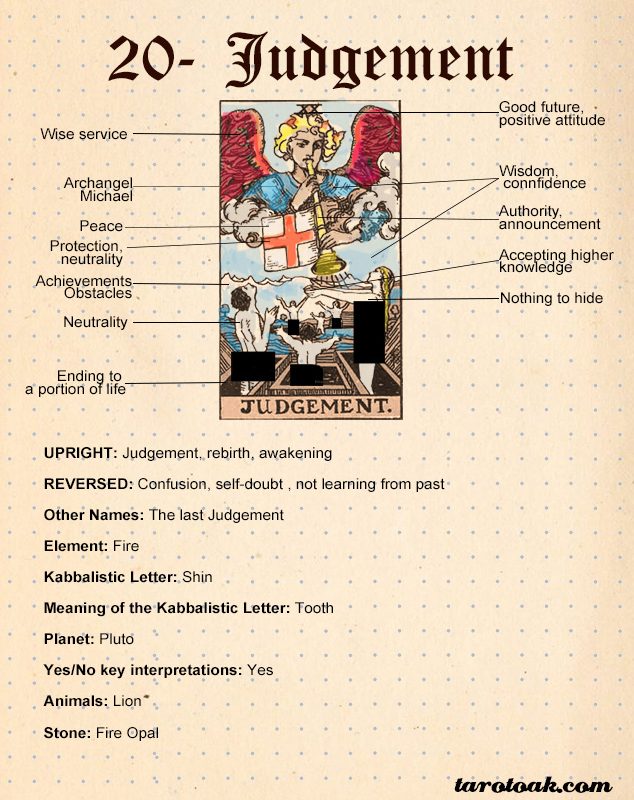The Judgment tarot card, often depicted with striking imagery of resurrection and renewal, evokes a blend of introspective reflection and profound insights. From a Christian perspective, the symbolism inherent in this card resonates closely with fundamental tenets of faith, particularly concepts of redemption, accountability, and divine judgment.
Historically, the Judgment card embodies the biblical notion of the Last Judgment, a pivotal event wherein the living and the dead are summoned before God for an assessment of their earthly deeds. This critical moment is mirrored in Revelation 20:12, which speaks of the dead being judged “according to what they had done as recorded in the books.” Such imagery does not merely serve as foreboding; it invites believers to contemplate the implications of their actions throughout life.
At first glance, the Judgment card may be perceived as ominous, evoking trepidation regarding divine evaluation. Yet, beneath this veneer lies an intriguing invitation for self-examination and moral rectification. This duality creates a compelling dynamic; it compels individuals to grapple with internal conflicts, pushing them toward spiritual evolution. It invites believers to reflect on their life choices, understanding that every action reverberates through time and eternity.
In Christianity, the essence of Judgment is inherently linked with mercy. This relationship can be elucidated through the concept of repentance and forgiveness. The imagery of the Judgment card symbolizes a call to rise from one’s past misdeeds, to bear the weight of one’s soul while simultaneously redeeming it. In this context, the blowing trumpet in many depictions serves as a harbinger of awakening, urging individuals out of complacency and toward a state of enlightenment.
Furthermore, the Judgment card echoes the transformative power inherent in Christian narratives. Much like the parables spoken by Jesus, wherein lost souls found their way back through grace and mercy, the card’s message encapsulates the potential for personal rebirth. Each time one confronts their faults, they are afforded the opportunity to transcend previous limitations and recalibrate their moral compass. They are urged to discard the ashes of regret and emerge, renewed and reinvigorated.
Despite its apparent focus on accountability, the Judgment card also evokes themes of community and collective responsibility. Just as Christians are called upon to support one another, the symbolism of resurrection and alignment serves as a reminder of the interconnectedness of our spiritual journeys. In recognizing the inherent value of a supportive community, believers can wield the power of healing and nurturing within themselves and others, cultivating a garden of spiritual growth.
As we delve deeper, we recognize that the Judgment card is not confined exclusively to the individual’s relationship with God; it extends to one’s ethical standing within society. The concept of communal judgment resonates with the teachings of the Church, which advocate for an accountability that exceeds personal boundaries. The Judgment card urges believers to contemplate not just their own paths to redemption, but also the moral landscape around them. This persistent awareness encourages actions that contribute positively to the collective, fostering an ethic of empathy and compassion.
Moreover, the Judgment card holds considerable relevance in the context of contemporary challenges faced by individuals and communities alike. In an increasingly disjointed world, it beckons believers to reclaim their identities, disentangled from the distractions of materialism and superficiality. The call to judgment encompasses an awakening to the realities of social injustices, urging Christians to act as stewards of faith in both personal and public spheres. This position offers an invigorating blend of hope and accountability, galvanizing individuals to advocate for righteousness in every facet of life.
In contemplating the Judgment card’s multifaceted significance, one may also discern an underlying theme of hope. The card’s message transcends fear of condemnation, instead emphasizing the untapped potential within each human spirit. Christians can take solace in the belief that judgment ultimately serves as a divine reassurance of mercy, inviting them to draw closer to God, relinquishing burdens and embracing the transformative love made manifest through Christ.
This theme resonates with the notion of the second chance, underscoring the belief that no soul is irretrievably lost. Just as the prodigal son reclaimed his place through the open arms of his father, so too can individuals return from the brink of despair to find redemption. The Judgment card teaches that the path to grace is often wrought with trials, yet it promises that transformation is perennial and available to all who seek it earnestly.
In summary, the Judgment tarot card serves as a profound catalyst for reflection within the Christian context. Its rich symbolism aligns seamlessly with essential doctrines of faith, illuminating pathways toward redemption and moral responsibility. By recognizing the deeper resonances embodied in this card, believers can cultivate a vibrant spiritual life that acknowledges both past transgressions and future possibilities. It calls them to address their lives earnestly, embrace the gift of mercy, and act as agents of renewal among their communities. In doing so, the Judgment card emerges not merely as a harbinger of endings, but as a clarion call for glorious new beginnings.







Leave a Comment